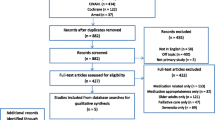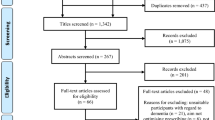Abstract
Aim
The aims of this manuscript are to report on several aspects that may deserve special consideration when individualizing decisions on the prescription appropriateness among people with dementia, and to discuss current research needs in relation to these aspects.
Methods
Review article based on selective literature.
Results
The aspects that may deserve special consideration are: the prescription of pychotropic medications, for being commonly inappropriately prescribed; the presence of advanced stage of dementia, comorbidities or multi-morbidity and/or frailty, as they can determine the prognosis and goals of care; the values and wishes of the person with dementia, as they may prioritize different goals of care; and medication adherence, as it may be poorer compared with persons without dementia. Further research on these aspects including representative participants is necessary as evidence base to guide clinical practice.
Conclusion
Individualised decisions on prescription appropriateness among people with dementia may require a comprehensive evaluation of the person in order to establish a shared care plan. Further research will probably support this process.
Similar content being viewed by others

References
International D. World Alzheimer Report 2018—the state of the art of dementia research: New frontiers
Nichols E, Szoeke CEI, Vollset SE, Abbasi N, Abd-Allah F, Abdela J et al (2019) Global, regional, and national burden of Alzheimer’s disease and other dementias, 1990–2016: a systematic analysis for the Global Burden of Disease Study 2016. Lancet Neurol 18(1):88–106
Livingston G, Sommerlad A, Orgeta V, Costafreda SG, Huntley J, Ames D et al (2017) Dementia prevention, intervention, and care. The Lancet 390:2673–734
Livingston G, Huntley J, Sommerlad A, Ames D, Ballard C, Banerjee S et al (2020) Dementia prevention, intervention, and care: 2020 report of the Lancet Commission. The Lancet 396:413–46
Spinewine A, Schmader KE, Barber N, Hughes C, Lapane KL, Swine C et al (2007) Appropriate prescribing in elderly people: how well can it be measured and optimised? Lancet 370:173–84
Gallagher P, Ryan C, Byrne S, Kennedy J, O’Mahony D (2008) STOPP (Screening Tool of Older Person’s Prescriptions) and START (Screening Tool to Alert doctors to Right Treatment). Consensus validation. Int J Clin Pharmacol Ther 46(2):72–83
Laroche M-L, Charmes J-P, Merle L (2007) Potentially inappropriate medications in the elderly: a French consensus panel list. Eur J Clin Pharmacol. 63(8):725–31
Delgado J, Bowman K, Clare L (2020) Potentially inappropriate prescribing in dementia: a state-of-the-art review since 2007, vol 10. BMJ Publishing Group, BMJ Open
Hukins D, Macleod U, Boland JW (2019) Identifying potentially inappropriate prescribing in older people with dementia: a systematic review. Eur J Clin Pharmacol 75:467–81
Holmes HM, Sachs GA, Shega JW, Hougham GW, Cox Hayley D, Dale W (2008) Integrating palliative medicine into the care of persons with advanced dementia: identifying appropriate medication use. J Am Geriatr Soc 56(7):1306–1311
Parsons C (2017) Polypharmacy and inappropriate medication use in patients with dementia: an underresearched problem. Ther Adv Drug Saf 8:31–46
Disalvo D, Luckett T, Agar M, Bennett A, Davidson PM (2016) Systems to identify potentially inappropriate prescribing in people with advanced dementia: a systematic review. BMC Geriatrics 16:114
Fick DM, Semla TP, Steinman M, Beizer J, Brandt N, Dombrowski R et al (2019) American geriatrics Society 2019 updated AGS beers criteria® for potentially inappropriate medication use in older adults. J Am Geriatr Soc 67(4):674–694
O’Mahony D, O’Sullivan D, Byrne S, O’Connor MN, Ryan C, Gallagher P (2014) STOPP/START criteria for potentially inappropriate prescribing in older people: version 2. Age Ageing 44(2):213–218
Ma H, Huang Y, Cong Z, Wang Y, Jiang W, Gao S et al (2014) The efficacy and safety of atypical antipsychotics for the treatment of dementia: a meta-analysis of randomized placebo-controlled trials. J Alzheimer’s Dis 42(3):20
Bronskill SE, Campitelli MA, Iaboni A, Herrmann N, Guan J, Maclagan LC et al (2018) Low-dose trazodone, benzodiazepines, and fall-related injuries in nursing homes: a matched-cohort study. J Am Geriatr Soc. 66(10):1963–1971
Dyer AH, Murphy C, Lawlor B, Kennelly SP, Lawlor B, Segurado R et al (2020) Cognitive outcomes of long-term benzodiazepine and related drug (bdzr) use in people living with mild to moderate alzheimer’s disease: results from NILVAD. J Am Med Dir Assoc. 21(2):194–200
Van Leeuwen E, Petrovic M, van Driel ML, De Sutter AI, Vander Stichele R, Declercq T et al (2018) Discontinuation of long-term antipsychotic drug use for behavioral and psychological symptoms in older adults Aged 65 years and older with dementia. J Am Med Dir Assoc 19(11):1009–14
Forester BP, Vahia I (2019) Behavioral And Psychological Symptoms—An Emerging Crisis Of The Alzheimer Dementia Epidemic. JAMA Netw Open. 2(3):e190790
Reeve E, Ong M, Wu A, Jansen J, Petrovic M, Gnjidic D (2017) A systematic review of interventions to deprescribe benzodiazepines and other hypnotics among older people. Eur J Clin Pharmacol. 73(8):927–935
Renn BN, Asghar-Ali AA, Thielke S, Catic A, Martini SR, Mitchell BG et al (2018) A Systematic Review of Practice Guidelines and Recommendations for Discontinuation of Cholinesterase Inhibitors in Dementia. American Journal of Geriatric Psychiatry 26(2):134–47
Colloca G, Tosato M, Vetrano DL, Topinkova E, Fialova D, Gindin J et al (2012) Inappropriate Drugs in Elderly Patients with Severe Cognitive Impairment: Results from the Shelter Study. PLoS ONE. 7(10):134–147
Thompson W, Lundby C, Graabæk T, Nielsen DS, Ryg J, Søndergaard J et al (2019) Tools for deprescribing in frail older persons and those with limited life expectancy: a systematic review. J Am Geriatr Soc 67:172–80
Kutner JS, Blatchford PJ, Taylor DH, Ritchie CS, Bull JH, Fairclough DL et al (2015) Safety and benefit of discontinuing statin therapy in the setting of advanced, life-limiting illness a randomized clinical trial. JAMA Intern Med 175(5):691–700
Narayan SW, Hilmer SN, Nishtala PS (2018) A population-level study examining discontinuation of statins in older people with dementia. Eur J Clin Pharmacol. 74(3):379–381
Browne J, Edwards DA, Rhodes KM, Brimicombe DJ, Payne RA (2017) Association of comorbidity and health service usage among patients with dementia in the UK: a population-based study. BMJ Open. 7(3):e012546
Poblador-Plou B, Calderón-Larrañaga A, Marta-Moreno J, Hancco-Saavedra J, Sicras-Mainar A, Soljak M et al (2014) Comorbidity of dementia: a cross-sectional study of primary care older patients. BMC Psychiatry. 14(1):1–8
Haaksma ML, Rizzuto D, Ramakers IHGB, Garcia-Ptacek S, Marengoni A, van der Flier WM et al (2019) The impact of frailty and comorbidity on institutionalization and mortality in persons with dementia: a prospective cohort study. J Am Med Dir Assoc. 20(2):165–170
Maxwell CJ, Mondor L, Hogan DB, Campitelli MA, Bronskill SE, Seitz DP et al (2019) Joint impact of dementia and frailty on healthcare utilisation and outcomes: a retrospective cohort study of long-stay home care recipients. BMJ Open. 9(6):e029523
Delgado J, Jones L, Bradley MC, Allan LM, Ballard C, Clare L et al (2021) Potentially inappropriate prescribing in dementia, multi-morbidity and incidence of adverse health outcomes. Age Ageing. 50(2):457–464
Koné Pefoyo AJ, Bronskill SE, Gruneir A, Calzavara A, Thavorn K, Petrosyan Y et al (2015) The increasing burden and complexity of multimorbidity. BMC Public Health 15(1):415
Cesari M, Marzetti E, Thiem U, Pérez-Zepeda MU, Abellan Van Kan G, Landi F et al (2016) The geriatric management of frailty as paradigm of the end of the disease era. Eur J Intern Med 31:11–4
Burt JR, Godin J, Filion J, Montero-Odasso M, Rockwood K, Andrew MK et al (2019) Frailty prevalence in the COMPASS-ND study of neurodegenerative disorders. Can Geriatr J 22(4):205–212
Kojima G, Liljas A, Iliffe S, Walters K (2017) Prevalence of frailty in mild to moderate Alzheimer’s disease: a systematic review and meta-analysis. Curr Alzheimer Res. 14(12):1256–1263
Porter B, Arthur A, Savva GM (2019) How do potentially inappropriate medications and polypharmacy affect mortality in frail and non-frail cognitively impaired older adults? A cohort study. BMJ Open. 9(5):e026171
Bolina AF, Gomes NC, Marchiori GF, Pegorari MS, Tavares DM, Dos S (2019) Potentially inappropriate medication use and frailty phenotype among community-dwelling older adults: a population-based study. J Clin Nurs 28(2122):3914–3922
Maclagan LC, Maxwell CJ, Gandhi S, Guan J, Bell CM, Hogan DB et al (2017) Frailty and potentially inappropriate medication use at nursing home transition. J Am Geriatr Soc. 65(10):2205–2212
Lavan AH, Gallagher P, Parsons C, O’Mahony D (2017) STOPPFrail (Screening Tool of Older Persons Prescriptions in Frail adults with limited life expectancy): consensus validation. Age Ageing. 75(5):723–731
Fialová D, Laffon B, Marinković V, Tasić L, Doro P, Sόos GO et al (2019) Medication use in older patients and age-blind approach: narrative literature review (insufficient evidence on the efficacy and safety of drugs in older age, frequent use of PIMs and polypharmacy, and underuse of highly beneficial nonpharmacological strategies). Eur J Clin Pharmacol 75:451–66
Geshell L, Kwak J, Radhakrishnan K (2019) Perspectives and experiences of persons with dementia with advance care planning: an integrative literature review. J Geriatr Psychiatry Neurol 32(5):231–245
Robben SHM, Perry M, Olde Rikkert MGM, Heinen MM, Melis RJF (2011) Care-related goals of community-dwelling frail older adults. J Am Geriatr Soc 59(8):1552–4
Charles C, Gafni A, Whelan T (1999) Decision-making in the physician–patient encounter: revisiting the shared treatment decision-making model. Soc Sci Med 49(5):651–61
Arlt S, Lindner R, Rösler A, von Renteln-Kruse W (2008) Adherence to medication in patients with dementia. Drugs Aging 25(12):1033–47
Geddis-Regan A, Errington L, Abley C, Wassall R, Exley C, Thomson R (2020) Enhancing shared and surrogate decision making for people living with dementia: a systematic review of the effectiveness of interventions. Heal Expect 24(1):19–32
Giguere AMC, Lawani MA, Fortier-Brochu É, Carmichael PH, Légaré F, Kröger E et al (2018) Tailoring and evaluating an intervention to improve shared decision-making among seniors with dementia, their caregivers, and healthcare providers: Study protocol for a randomized controlled trial. Trials. 19(1):e186
El-Saifi N, Moyle W, Jones C, Tuffaha H (2018) Medication adherence in older patients with dementia: a systematic literature review. J Pharm Pract. 31(3):322–334
Kröger E, Tatar O, Vedel I, Giguère AMC, Voyer P, Guillaumie L et al (2017) Improving medication adherence among community-dwelling seniors with cognitive impairment: a systematic review of interventions. Int J Clin Pharm. 39(4):641–656
Ellis G, Gardner M, Tsiachristas A, Langhorne P, Burke O, Harwood RH et al (2017) Comprehensive geriatric assessment for older adults admitted to hospital. Cochrane Database Syst Rev. https://doi.org/10.1002/14651858.CD006211.pub3/full
Baronner A, MacKenzie A (2017) Using geriatric assessment strategies to lead end-of-life care discussions. Curr Oncol Rep 19(11):75
Molist Brunet N, Sevilla-Sánchez D, Amblàs Novellas J, Codina Jané C, Gómez-Batiste X, McIntosh J et al (2014) Optimizing drug therapy in patients with advanced dementia: a patient-centered approach. Eur Geriatr Med 5(1):66–71
González-Bueno J, Calvo-Cidoncha E, Sevilla-Sánchez D, Molist-Brunet N, Espaulella-Panicot J, Codina-Jané C (2018) Patient-centered prescription model to improve therapeutic adherence in patients with multimorbidity. Farm Hosp 42(3):128–134
Author information
Authors and Affiliations
Corresponding author
Ethics declarations
Conflict of interest
None declared.
Ethical approval
Not required.
Informed consent
The author gave consent for publication.
Additional information
Publisher's Note
Springer Nature remains neutral with regard to jurisdictional claims in published maps and institutional affiliations.
Rights and permissions
About this article
Cite this article
Renom-Guiteras, A. Potentially inappropriate medication among people with dementia: towards individualized decision-making. Eur Geriatr Med 12, 569–575 (2021). https://doi.org/10.1007/s41999-021-00502-7
Received:
Accepted:
Published:
Issue Date:
DOI: https://doi.org/10.1007/s41999-021-00502-7



